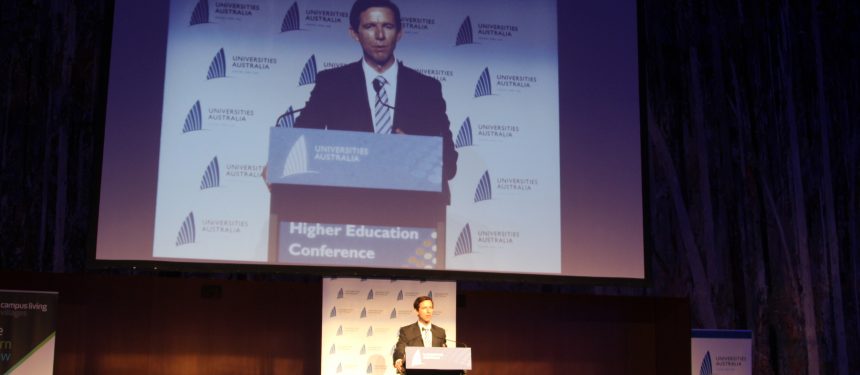Tightened access to international education for VET providers and increased agent transparency are among a raft of proposed changes to Australia’s international and domestic education policies.
News and business analysis for Professionals in International Education
Have some pie!
Australian government to target the “rorters and shonks”
 Minister Birmingham at the Universities Australia gala dinner in 2016. Photo: The PIE News
Minister Birmingham at the Universities Australia gala dinner in 2016. Photo: The PIE News The Education Legislation Amendment (Provider Integrity & Other Measures) Bill 2017, which incorporates changes to the ESOS, TEQSA and HESA Acts, includes provisions for increased powers to veto unscrupulous VET providers accessing both higher education and international education.
Using data already available on the Provider Registration and International Student Management System, the bill also looks to provide agent visa performance tracking for the first time, however, the extent to which the information will be available is not yet clear.
“All of us have a stake in safeguarding a system that is one of the most robust in the world”
“This is a pre-emptive strike against the rorters and shonks [the] government has shut out of the vocational loans system after we closed down [the] VET FEE-HELP scheme,” education minister Simon Birmingham said in a statement.
According to Birmingham, the increased regulatory powers will prevent unscrupulous training providers from attempting to recoup losses suffered after being kicked out of the new VET Student Loan system and “infecting” the higher education and international education sectors.
“This Bill will ensure that the quality for which our higher education sector is renown, across public and private universities and non-university higher education providers, is protected and enhanced in the years ahead,” he said.
The proposed changes have been welcomed by the international education industry, with ACPET chief executive Rod Camm saying any changes that prevent exploitation of international students were supported by his organisation.
“Australia’s regulatory protections for international students are regarded worldwide as being strong and robust. If there is evidence to indicate an education provider is breaching those protections, ACPET supports swift rectification,” he told The PIE News.
Universities Australia chief executive Belinda Robinson also expressed support for the government’s intention to tighten further an already rigorous system.
“All of us have a stake in safeguarding a system that is one of the most robust in the world,” she said.
IEAA chief executive Phil Honeywood meanwhile said the inclusion of reporting on agent performance would “promote greater transparency and accountability in educator-agent relationships and the wider sector.”
The bill does not, however, include an “opt out” provision, as had previously been indicated by the Department of Education and Training.
Honeywood said requiring all agents’ performance be tracked would “encourage agents to ensure that students choose the most appropriate course and provider for them”.
“If certain agents have very high student visa rejection data and bad academic progress outcomes then stakeholders have a right to know,” he added. “Their education provider partners, prospective student clients and the Australian government should be able to ask questions based on available performance data.”
“The release of limited information about agent performance will help education providers to make informed choices about the agents they work with,” Camm agreed, adding it would also assist providers to meet their obligation to work with ethical agents.
“If certain agents have very high student visa rejection data… then stakeholders have a right to know”
While positive, Honeywood also cautioned the need for ongoing vigilance to protect the Australian international education brand and close loopholes that wrongly motivate education providers.
“Even if providers abide by all existing legislative and regulatory requirements, in seeking to maximise their enrolments they can often encourage a ‘race to the bottom’ with abnormally low tuition fees particularly for business studies/accounting courses,” he said.
“By the time these providers have paid large commissions to education agents their tuition fee structure is only sustainable if they cut corners on quality.”
Australia’s vocational sector currently enrols the second largest proportion of international students, with 2017 year to March data indicating a 15% jump in enrolments from 2016.
Still looking? Find by category:


